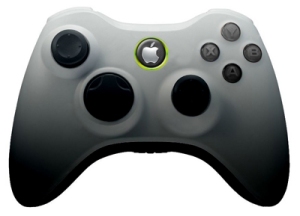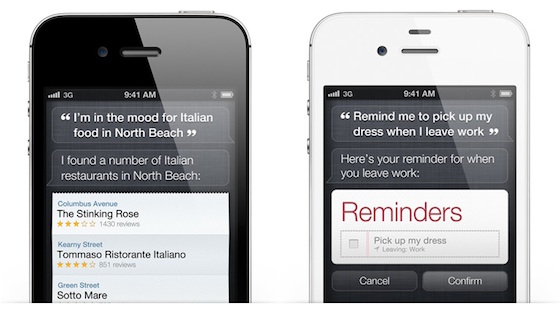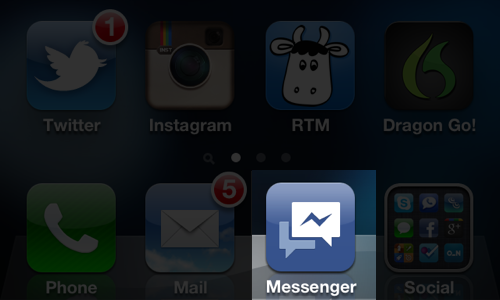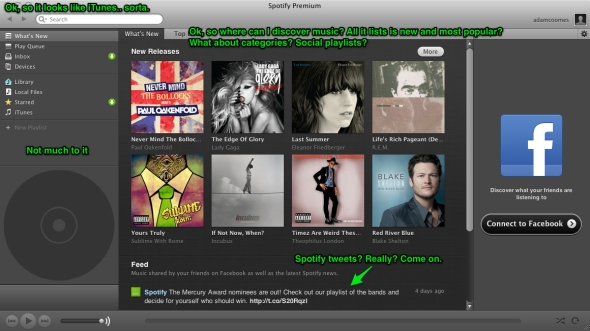Apple’s Overlooked Massive Opportunity: A Video Game Console (Using Apple TV)
Posted: February 21, 2013 Filed under: Apple 1 Comment
This past year has shown a lot of promise for video game and console innovation. Some of the year’s most successfully funded Kickstarter projects have included the highly anticipated Android console, Ouya, as well as the GameStick – also an Android-based video game console. Both of these devices are trying to take the success of mobile gaming and bring it to the living room, ready to take on the fight for your big screen real-estate.
The explosion of the Smartphone and Tablet has provided a new video game landscape, one that embraces the joys of gameplay more than the novelty of ever-increasing graphics. It embraces the nostalgia of 8-bit and 16-bit gaming, which many argue was the golden era of games. It leaves the market wide open for indie game developers, giving them a level playing field with the big studios. In fact, some of the biggest hits are brand new games developed by small teams, besting even EA powerhouse titles. It’s the Wild West, limited only by the sandbox of the mobile platforms. It’s anyone’s game (pun intended).
Look at the market. Smartphone owners alone have crossed 1 billion Worldwide. That’s a large chunk of the world. And all of these smartphone owners have instant access to a huge catalog of games. And best of all, the market has pushed the expected price of a video game much lower than any console or handheld gaming device. While most handheld games run between $20 and $30, most mobile games are priced between $1 and $5. It’s less of a financial commitment, easier, more convenient and caters to a much larger market. It’s no surprise that mobile games beat handheld games in spending last quarter.
Apple has established themselves as the best mobile gaming platform. They have paved the way. The quality and quantity of iOS games has made the iPhone and iPad a real competitor to the console market. Android isn’t far behind. But what’s strange is that neither of these platforms have really encouraged or facilitated the ability to bring this massive collection of quality games to the screen that is most important for video games – the Television. The creators of Ouya saw this as a huge opportunity, and over 63,000 people agreed, making Ouya one of the most successful Kickstarter campaigns ever.
It makes sense. People play video games at home more than anywhere else. Why not play them on the best possible screen in the comfort of your living room? But this is only the beginning. Most gamers agree that the biggest issue of mobile gaming is its lack of buttons – a crutch that can make or break your performance in the game and can really hinder the experience. That’s why 3rd party mobile controllers is a big market in itself. People want them. Yet, Apple and Android don’t officially support them. iOS is even worse than Android, as its closed nature provides little opportunity for wide-scale controller support unless all developers specifically implement one controller. It’s not going to become a consolidated effort until Apple makes an official gamepad and a developer API to go with it.
Apple shareholders are getting impatient and worried that Apple is running out of markets to dominate. I would argue that Apple needs to stay focused, and I would rather they continue to produce great products in a few markets than spread themselves thin trying to tackle too many. But, there is an obvious play that I think they are overlooking. Apple has established themselves as a leader in the video game market. Yet, they are barely acknowledging it. They don’t need to compete with the Sony PS4 or the new Xbox. They are positioned to completely innovate and disrupt the indie market, just like Ouya is about to, and it may already be too late.
So what needs to happen? Apple TV makeover. They already have a great living room device. Make a TV app store. Give developers the ability to support TV resolutions. Make an Apple gamepad. Create a gamepad API so developers can simply implement gamepad support. It’s that simple. You’re now a video game console. iOS developers can give their games TV support quickly and easily. You now have a controller that can work with your iPad, iPhone or TV games. You can buy a few controllers and play multiplayer games. These things alone will hugely disrupt the video game market. Xbox 720 (or whatever it will be called) and the PS4 can own the high graphics, high performance big studio market. Apple TV can own the indie market. Hell, they could even be a real competitor to Xbox and PS4 if they improve the specs. And with an App Store, you’re looking at iOS prices, which is a huge win for consumers.
The reality is this – this market is massive. Apple is positioned to be a real player in it, and it would barely take any work. Maybe it’s going to take Ouya to show Apple what they are missing out on.
How To Fix & Improve iPhone 4S Battery Life [Batterygate]
Posted: October 29, 2011 Filed under: Apple, iPhone, iPhone 4S | Tags: Battery, Battery Life, Fix, Improve, iPhone 4S Leave a commentApple hasn’t had the best luck on phone launches lately. Last year with the iPhone 4, it was Antennagate. This year, iPhone 4S owners were quick to notice that their battery life was quite disappointing – some only making it through only half of a day before needing a charge. Many determined that it is noticeably worse than the iPhone 4. Some are calling it Batterygate. Regardless, it’s a real problem.
This is more than likely a software issue, rather than hardware, so we just have to wait for Apple to fix it. The good news is, Apple is working on it. The bad news is, we don’t know how long we’ll have to wait for this update.
While we all wait, many Apple users have been testing the heck out of settings and services trying to determine the source for the drain. I’ve been having this issue myself, so I’ve been researching and testing as well. It appears that we may have discovered one of the main sources of the drain.
Watch the video below for an explanation and how to fix it.
iPhone 4S and Siri is more game changing than we realize
Posted: October 11, 2011 Filed under: Apple, iPhone Leave a commentVoice control. Pretty great phone feature, right? Any Android user would know and be happy to tell you that it’s quite useful. In fact, Android’s extensive voice capabilities has been the one killer feature that had me considering an Android over my much loved iPhone for years. I can’t tell you how many times I’ve nearly been in an accident trying to look up directions on my iPhone while driving. Being able to say “Navigate to [place]” is not just handy, but important for safety. So when I heard about Apple buying Siri back in 2010, I knew they were about to catch up. They had to. But, the extent of why how significant this could be didn’t occur to me until Apple announced iPhone 4S with Siri integration. It hit me as they began to demonstrate it.
Many Apple fans were disappointed by the announcement of the iPhone 4S, anticipating an iPhone 5 with a rumored brand new design, larger screen, and thinner body. Instead, fans were let down by an unchanged appearance from the iPhone 4. So let down, in fact, that I believe they simply overlooked many of the great additions to the device – an A5 processor making the device nearly 3X faster, a better camera with 1080p video recording, better battery life and of course, the incredible integration of Siri. I think many of us haven’t realized the impact Siri’s integration may have on our lives and the future of mobile phone interaction.
Why is it such a big deal? Voice control has been around since before smart phones. Many Android fans will tell you that Apple is simply catching up, and that Android’s voice integration is more robust than Apple’s Siri integration. Though these arguments are mostly true, Apple and Siri has changed the game with one very important word.
Context.
Never before were we able to interact with our mobile devices by speaking to them like a human. This is a breakthrough on many levels, akin to the beloved Watson machine, created by IBM to beat the best human players of Jeopardy (and succeeded in doing so) by understanding the context of questions asked to it and providing an accurate answer. Siri may not have the capabilities of Watson, but this is a huge leap forward. The possibilities are astounding. Just looking at some of the many Siri voice examples, you can begin to grasp just how much this will affect and improve our daily lives.
Wake me up tomorrow at 7am
Mail Lisa and Jason about the party and say I had a great time
Any new email from Michael today?
Remind me to call my mom when I get home
How windy is it out there?
What is an 18% tip on $86.74 for four people?
What’s really mind blowing is how abstract these commands are. You just simply talk to it. It’s hard to wrap your mind around that. We are all so used to giving specific keyword-based voice commands that it will be hard for us to even comprehend how we can utilize something like this. But the beauty is that we don’t have to think about it. We just talk, like any person would talk to their secretary. And it follows the conversation. In Apple’s own demonstration video, you may ask for Siri to read you a message. Then you might say something like “Do I have any meetings tomorrow?”, wait for the response, then say “reply with Sure, let’s move the meeting”. Siri will remember the message and reply to it. To go beyond that, you can even teach it references so it knows who you’re referring to when you say “wife”, “brother” or “work”.
The possibilities are incredible. Imagine how much time it will save you to avoid tedious tasks like setting up reminders, alarms, managing your calendar, making notes, or sending simple emails and text messages. I imagine some secretaries may have just lost their jobs. On the bright side, all iPhone 4S owners have just hired one.
This is no longer voice control. This is an artificial assistant. The game is about to be changed in a big way. The user will no longer have to worry about referencing a manual to issue voice commands. The user speaks, not in a specific structured format, just as they would to another person and the software will decipher the sentence and perform the task.
The most amazing thing of all? This is only the beginning. Siri has been stamped with “beta” status, meaning that there is much more to come. If Apple has just set a new bar and a new standard for the industry, as Apple tends to do, I can’t even begin to comprehend what new ways we’ll be able to interact with our devices and how it will change our lives. Yes, we’re all sad that we won’t have a shiney new iPhone 5 to hold in 2011, but let’s get past it and appreciate that we get to experience the dawn of the future.
Why I cancelled my Spotify subscription in 2 days
Posted: July 23, 2011 Filed under: Apps, Music | Tags: grooveshark, mog, rdio, rhapsody, sean parker, slacker, spotify 4 CommentsSpotify has been all the rage the last couple of years. And, rightfully so. A product of Sean Parker, well-known as the founder of Napster and one of the key members of Facebook, it had success written all over it. And, who could say no to the concept of unlimited, free music that you could instantly play at any time. It all sounded way too good to be true.
Fast forward a few years. After countless delays on their U.S. launch, Spotify fell way behind and was no longer the first U.S. player in the cloud music industry. During this massive delay, many competitors popped up, such as Rdio, MOG, and Slacker to name a few. These services all jumped in the game with a slightly less ambitious service, charging $5 or $10 a month for unlimited music.
I, for one, didn’t feel like waiting around for Spotify. In fact, I was very willing to pay $10 a month to eliminate the need to manage music files on my computer. I can’t tell you how much I hated dealing with it. So I jumped on the Rdio bandwagon. Hearing that Rdio was founded by former founders of Skype and Kazaa, I was sold. These are smart guys, and I was confident that this was going to be my service of choice for now.
I used Rdio for months and really enjoyed the service. But then, the bomb dropped. Spotify launched in the U.S. However, during all of their challenges, the once promised unlimited free music streaming service was no longer free at all. In fact, their pricing model is nearly indentical to Rdio and many of the other cloud music services available. So, was it still worth it? I had to find out. So, I paid for a $10 subscription and dove in.
My first reaction.
Ok, so it’s not bad. It seems relatively light. I was immediately disappointed to see no top user playlists. This was something I grew to like very much about Rdio. For example, one of the top user playlists in Rdio is the Billboard Top 100 that is constantly being updated. Brilliant. If I want to listen to current popular music, I just fire up Rdio and hit play on that playlist. With Spotify, I have to have a friend who shares a similar playlist with me. I don’t know about you, but none of my friends are constantly updating a Billboard Top 100 playlist just for my enjoyment.
One thing I liked was the ability to upload my own songs and sync them to my phone. This was a nice feature of Spotify, but not nice enough. Especially because the syncing only worked when my phone was plugged in. I was told this is supposed to work over Wi-Fi, but did not seem to work for me. Regardless, that gives me no real advantage over just using iTunes.
Next, I had to jump in the mobile app. Rdio has a pretty slick iPhone app, so I knew it had a lot to live up to. It seemed decent enough, but still missing a lot of what makes Rdio great. Even something as simple as adding a song to your playlist takes several taps (and you have to play the song first). Whereas, with Rdio, you search for the song, click the little “+”, and you add it immediately. This is important for a mobile app, especially if you want to add a quick song while you are in your car waiting at a stoplight, for example.
Other great features Rdio has that Spotify does not:
- Your listening history – say I just listened to something on my desktop and forgot to add it to a playlist, I could check the history and play it from my iPhone, for example.
- Recommended songs
- Detailed activity of your friends’ music actions
- Analytics on your music taste (your heavily rotated songs, artist tags, etc)
I gave it two days, and I’m convinced that I’m getting absolutely no benefit from using Spotify over Rdio. Granted, Spotify claims to have one of the largest music collections (15 million to Rdio’s 9 million) but I have yet to see this being an issue for any song I’ve searched for (either they both had them or they both didn’t). The truth is, I prefer Rdio. Now, don’t get me wrong, if Spotify launched as a free service or as a subscription service two years ago, I would’ve used it in a heartbeat. Unfortunately for Spotify, there are now other great options available, and Spotify does not have anything special to offer. Sorry Spotify, I wanted to love you, but I had to cancel.
Update: Apparently you can add songs quickly in the mobile app by swiping on the track. It wasn’t very obvious, but that’s a handy feature and good to know. I have to give a few points back to Spotify on that.
Startup Weekend Brings Out The Best People
Posted: July 21, 2011 Filed under: Startup Weekend | Tags: startup weekend Leave a commentWhen you think of startups, you think of fast-paced, small, intense environments. You think of young people working long hours. You think of cut-throat aggression. So what is it about Startup Weekend, a competition where teams build an entire startup in 54 hours, that brings out the most genuine, positive, and great people in every city?
For me, what started as a way to support our startup community in Kansas City evolved into an opportunity to help facilitate Startup Weekends around the nation. The more I attend, the more it amazes me. Everyone I talk to, I like. No matter if I’m in New York, California, Florida or Omaha, it doesn’t matter. I always leave with great new friends. What is it about this event?
Is it supporting the community?
My guess is that if you attend a Startup Weekend with the intention of supporting your city and the local startup community, you’re probably an awesome person. But do people know this going into it? I’m not sure. It is certainly exciting when your city hosts an event that has been enjoyed by thousands of others in many other cities. But, it’s common that nearly all attendees of the first Startup Weekend in a city are first-timers and don’t know a lot about the event ahead of time.
Is it independence and aspiration?
You can certainly say that to attend a Startup Weekend, you have to have a certain bit of independence to want to take a risk, make a change, and learn about yourself. There’s definitely a level of ambition that is required, and many come with the intention of breaking free from the normal “9 to 5” mentality.
Maybe these types of people are naturally more self-aware. Maybe it’s the fact that they are confident in themselves and their talents and they feel ready to jump out of their safety net. It takes a positive person to make this decision.
Is it sacrificing a weekend?
Everyone loves their weekends. To see people giving up their entire weekend for an event filled with hard work always blows me away. To me, this may be the most telling aspect. In order to make that commitment, you have to be filled with passion, excitement and hope. I bet if you asked 20 people if they’d be willing to give up their weekend to work, 1 might say yes.
Is it team accomplishment?
Going into the event, most people know that they will be working in a team. Because of this, I think the event tends to bring out people who get along well with others. After all, you’re devoting your weekend to work on a project with a group of, most likely, strangers. To understand this arrangement and choose to attend and be a part of this event takes an open-minded, compassionate individual.
Is it the potential of success?
Ultimately, Startup Weekend is about building something in a weekend that could lead to something much more exciting. Just ask Twilio, Foodspotting or Zaarly. There have been many real companies that were born at a Startup Weekend, some receiving millions in funding and revenue. Is it the excitement of knowing you could be a part of something that could lead to real success?
Going into the event with the intention of creating success for yourself takes a level of ambition and hunger. It’s a risk, and any individual must have high level of energy and enthusiasm to go for it.
Regardless, the reasons aren’t important. It never fails that Startup Weekend brings out the most fantastic people in every community. The event is truly amazing and to see this happen city after city, there’s clearly something very special about it. Startup Weekend is much more than an event – it’s a club. And quite possibly, the best damn club on Earth.


